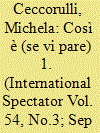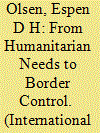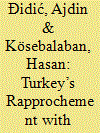|
|
|
Sort Order |
|
|
|
Items / Page
|
|
|
|
|
|
|
| Srl | Item |
| 1 |
ID:
168605


|
|
|
|
|
| Summary/Abstract |
The importance of the portrayal of reality in the press is well recognised, especially with respect to its capacity to affect public opinion. Articles on migration found in the Italian press with respect to four periods – the 2014 European Parliament elections; the end of the Mare Nostrum operation in the Mediterranean in 2014; the EU-Turkey Statement of March 2016; and an eventless week in 2016 – revealed five main narratives: solidarity, responsibility, state-centred (Westphalian), instrumental and humanitarian. Each of them had its own specificities, while all were informed by Italy’s condition as a frontline state with regard to migration – the EU’s gatekeeper – and its paradoxical state of living in a ‘permanent/potential emergency’, constantly torn by its inability to reconcile security and humanitarian needs. An understanding of justice as non-domination was the main result of the analysis carried out, while there was little reference to migrants’ human rights.
|
|
|
|
|
|
|
|
|
|
|
|
|
|
|
|
| 2 |
ID:
168609


|
|
|
|
|
| Summary/Abstract |
Migration is a topic that has frequently been present in political debates and the mass media in recent years, especially following the European and EU migration and refugee crisis. Newspaper debates in Norway presented different narratives with different conceptions of global justice. Migration is by definition a cross-border issue that has a direct effect on the interests of states as well as individuals, therefore the question of global justice is highly relevant. Three core media narratives were present: the humanitarian, the statist, and the EU integration narrative, which particularly highlights Norway as an integrated non-member of the EU. In the humanitarian narrative, a notion of impartiality of universal individual rights was prevalent, while in the statist narrative and to some extent in the EU integration narrative, a territorial and state-oriented conception of justice as non-domination was visible. Concerns about human rights were prevalent mainly in matters far away from Norway, but less so when the so-called migration crisis hit Norway directly.
|
|
|
|
|
|
|
|
|
|
|
|
|
|
|
|
| 3 |
ID:
168608


|
|
|
|
|
| Summary/Abstract |
It is generally agreed that a massive influx of foreigners into a country is not only a social issue to be understood and managed, but also something that prompts strong sentiments and moral qualms. By associating the narratives that emerged recently in UK mainstream media, through which the British public ‘made sense of’ (im)migration, with specific conceptions of justice, it is possible to discern the normative premises of the country’s response to (exceptional) movements of people within the EU migration system of governance. Remarkably, while migration narratives hinge to a large extent on the need to ‘take back control’ and ‘defend’ a threatened nation, the EU proves to be a problematic, yet very salient component of Britain’s debate on immigration, which could continue even after the latter’s progressive detachment from the Union.
|
|
|
|
|
|
|
|
|
|
|
|
|
|
|
|
| 4 |
ID:
168606


|
|
|
|
|
| Summary/Abstract |
Looking at the French approach to migration in four key political moments between 2014 and 2018, three main narratives can be seen as dominating the French debate on migration, namely the Westphalian, the humanitarian and the multilateral, each related to various justice claims. Surprisingly, a securitarian approach was not as dominant as expected. However, different justice claims were used to support various political interests, often in a clearly instrumental way. In France today, the politics of migration are still important for the country’s foreign policy and are not just a domestic issue.
|
|
|
|
|
|
|
|
|
|
|
|
|
|
|
|
| 5 |
ID:
168610


|
|
|
|
|
| Summary/Abstract |
Despite various analyses of the extent of Iranian-Russian rapprochement, questions still remain about its fundamental elements and its sustainability in the face of the conflicting interests of the two countries. Iran and Russia have pursued security convergence as a joint power maximisation policy, which can be better understood through Iran and Russia’s common feelings of ‘international misrecognition’ and ‘common threat perceptions’. These are the pillars of the nexus between them, explaining how the two countries have a shared understanding of their security environment and particularly how their mutual sense of insecurity has taken the lead in forging bilateral relations. As long as these pillars remain effective, existing limits to bilateral relations rooted in mistrust, disagreements and rivalries will not have significant effects on the convergence.
|
|
|
|
|
|
|
|
|
|
|
|
|
|
|
|
| 6 |
ID:
168607


|
|
|
|
|
| Summary/Abstract |
The political language of radical nationalism, combined with the logic of justice as non-domination, has become hegemonic in the Hungarian press. The structural position and related discursive traditions of the country form the background against which migratory processes and their interpretations are examined in this article, making the analysis revealing also in regional terms. In the Hungarian case, alternative narrative frames and justice logics are linked to migration collapse in the face of a nationalist ‘freedom fight’ and efforts to create and preserve an ethnically and culturally homogenous nation – and Europe.
|
|
|
|
|
|
|
|
|
|
|
|
|
|
|
|
| 7 |
ID:
168612


|
|
|
|
|
| Summary/Abstract |
As a critical orientation in Saudi Arabia’s interactions with the outside world, ‘looking East’ has breathed new life into the Arab country’s rather mundane and modest foreign policy, long characterised by strong attachment to Western countries, the United States in particular. Despite their explicit intention not to replace pivotal Western allies with Asian partners, the Saudis have fostered closer connections to the East virtually in every area, covering politico-strategic, military, economic, technological, and cultural spheres. The Saudi looking-East drive has, moreover, dovetailed neatly with an equally salient approach among major Asian nations to advance their vastly expanding interests in important Middle East countries.
|
|
|
|
|
|
|
|
|
|
|
|
|
|
|
|
| 8 |
ID:
168604


|
|
|
|
|
| Summary/Abstract |
In the last few years, migration has been at the centre of attention of the European public and policymakers, sparking an unprecedented debate on responsibilities and rights. This Special Issue presents a collection of European case studies analysing narratives of migration and their embedded justice claims. It focuses on the way national newspapers have covered and discussed key political events related to European politics and migration dynamics between 2014 and 2018. The results reveal an increasing normalisation of extreme and anti-immigrant claims in all cases. The only rather frequent counter-narrative is ‘humanitarian’, yet, it predominantly depicts migrants as victims, hence denying their subjectivity and actorness. There is an important correlation between the debates on migration and the European Union, as the so-called ‘crisis’ has strengthened the political debate on the EU in European countries. All in all, the dominant narratives on migration embed a Westphalian understanding of justice (justice as non-domination), while little attention is devoted to cosmopolitan justice claims (justice ad impartiality) and, much less, to ‘subjectivised cosmopolitan justice claims’ (justice as mutual recognition).
|
|
|
|
|
|
|
|
|
|
|
|
|
|
|
|
| 9 |
ID:
168611


|
|
|
|
|
| Summary/Abstract |
Despite Russia’s increasing clout and assertiveness in its region, Turkey has chosen to improve its relations with Russia, rather than balance against it through its Western allies. Turkey’s unexpected strategic partnership with Russia is best seen as an example of bandwagoning for profit. It is an assertive bandwagoning with the objective of countering Kurdish separatism, an imminent problem in the Turkish ruling elite’s ranking of threat perceptions. The empowerment of Syrian Kurdish groups under the protection of the United States has moved Turkey closer to Russia. A long-term alliance between the two, however, depends on reconciliation of their differences which are deeply rooted in historical and geo-political factors.
|
|
|
|
|
|
|
|
|
|
|
|
|
|
|
|
|
|
|
|
|